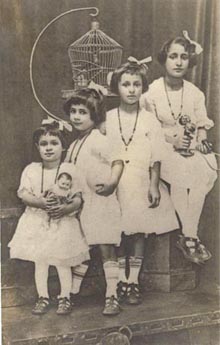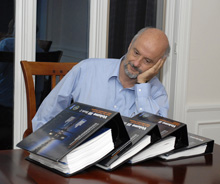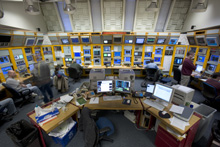 | Tuesday, August 29, 2006 |
|
Tuesday, August 29 12:00 p.m. Wellness Works Brown Bag Seminar - 1 West Speaker: B. Svazas, Fermilab Title: Avian Flu (Bird Flu) 3:30 p.m. Director's Coffee Break - 2nd floor crossover 4:00 p.m. Accelerator Physics and Technology Seminar - 1 West Speaker: M. Woods, Stanford Linear Accelerator Center Title: MDI Studies at the ILC and Related Test Beam Program at SLAC's End Station A Facility
Wednesday, August 30 Click here for a full calendar with links to additional information. |
|
Extended Forecast |
Secon Level 3 |
|
Tuesday, August 29 -Creamy Turkey Vegetable -Chicken Gyros -Chicken Cacciatore -Italian Panini w/Provolone -Assorted Slice Pizza -Super Burrito |
|
Wednesday, August 30 Lunch -Wild Rice and Grilled Duck Salad -Steamed Snow Peas -Amaretto Cheesecake
Thursday, August 31
Chez Leon Menu |
| Fermilab Today is online at: http://www.fnal.gov/today/ Send comments and suggestions to today@fnal.gov Fermilab Today archive Fermilab Today PDF Version Fermilab Result of the Week archive Fermilab Safety Tip of the Week archive Linear Collider News archive Fermilab Today classifieds SuBscribe/UnsuBscribe to |
| Another piece of the puzzle: Bolle describes '20s farm life | ||
| In August, former farmgirl Lottie Bolle visited Fermilab to speak with Adrienne Kolb and Bob Lootens of the history committee. As a member of the previously unrecorded Pasetti family that lived at Fermilab Site 25, Bolle's visit provided another piece of the puzzle...a glimpse of life before the lab. | ||
| ||
|
All that remains of the farm Lottie Bolle grew up on is a large cottonwood tree near Kirk and Giese Roads. But when the 86-year-old woman came to Fermilab a few weeks ago to visit the land where she grew up in the 1920s and 1930s, memories flooded back.
"When my father used to go out to work [on the farm], he'd take care of the hayloader and I would drive the horse," said Bolle. "He'd even let me drive the tractor sometimes." Bolle--whose maiden name is Pasetti--was four years old in 1924 when her family moved from Italy to the mostly German farm settlement where Fermilab now lies. Bolle says she learned English in a oneroom school house, rode her horse bareback and took piano lessons from a neighbor for 25 cents an hour. When Bolle turned 14, she was given permission to go to high school--a privilege that her older sisters, who worked the farm as teenagers, did not have. This meant getting a ride to school from a neighbor, Harold Pahnke, who had a crush on her. "There was no transportation except Harold had a little green Ford. I'd go milk my cows, and then run in the house and stick my feet in a bucket of water and try to get cleaned up [before school]," she said.
But during Bolle's teenage years, things at the farm got tougher: Bolle's father, a hard-working man who loved opera, became mentally ill after being kicked in the head by a horse. The family's pigs died of cholera, and maintaining the 117-acre farm became difficult. "I think he wanted to get away from the city life to go to the farm, but it was so stressful for him," said Bolle. Once he was institutionalized, Mr. Pasetti's signature--and therefore, his ability to sell land--was no longer valid. Lottie's older brother eventually transferred the land to their Romanian farmhand, Peter Tyioran. The Pasettis moved away in 1934. "I loved the farm," said Bolle. "I cried and cried and cried when we had to leave."
You can learn more about the Tyiorans, Pahnkes, Passettis and others on the History Committee's website and interactive map. |
|
Azom.com August 25, 2006: Start of ATLAS, World's Largest Scientific Experiment UCL scientists involved in the construction of a 16-mile-long tunnel under Geneva last week saw the beginning of ATLAS, the world's largest scientific experiment.
The tunnel is home to a giant particle accelerator, the flagship facility of CERN, the European Laboratory for Particle Physics. In the ATLAS experiment, particles will be fired towards each other at speeds of more than 600 million miles an hour. Their collisions will be recorded by a semiconductor tracker - essentially an ultra-sensitive digital camera - which can take 40 million pictures in a second and measure particle paths to an accuracy of a tenth of the width of a human hair.
|
|
|
Scottish Country Dancing Scottish Country Dancing will meet Tuesday, August 29, in the Ramsey Auditorium in Wilson Hall. Instruction begins at 7:30 p.m. and newcomers are always welcome. Most dances are fully taught and walked through, and you do not need to come with a partner. Scottish dancing will move back to Kuhn Barn beginning September 5. Info at 630-840-8194 or 630-584-0825 or folkdance@fnal.gov.
Blood drive
Brown Bag Seminar on Avian Flu |


